Ethical Dilemma in Research: Workplace Job Satisfaction Survey
VerifiedAdded on 2021/02/19
|7
|1844
|364
Report
AI Summary
This report presents a case study of an ethical dilemma encountered by a middle manager tasked with conducting a job satisfaction survey under the direction of an autocratic Managing Director. The core issue revolves around the Managing Director's directive to number questionnaires, thereby compromising respondent anonymity and violating ethical research principles. The report explores the conflict between the manager's duty to fulfill the leader's instructions and the imperative to protect the privacy and integrity of the survey participants. It delves into the concept of ethical dilemmas, presenting options for the researcher to navigate the situation while minimizing ethical breaches. The report highlights the importance of informed consent, data privacy, and the potential consequences of unethical practices. The report suggests strategies such as randomizing questionnaire distribution and manipulating the submission process to maintain respondent anonymity while appeasing the Managing Director. The conclusion emphasizes the need for careful analysis, consideration of consequences, and selection of the least ethically problematic course of action when facing ethical dilemmas in research.

ASSIGNMENT
Paraphrase This Document
Need a fresh take? Get an instant paraphrase of this document with our AI Paraphraser
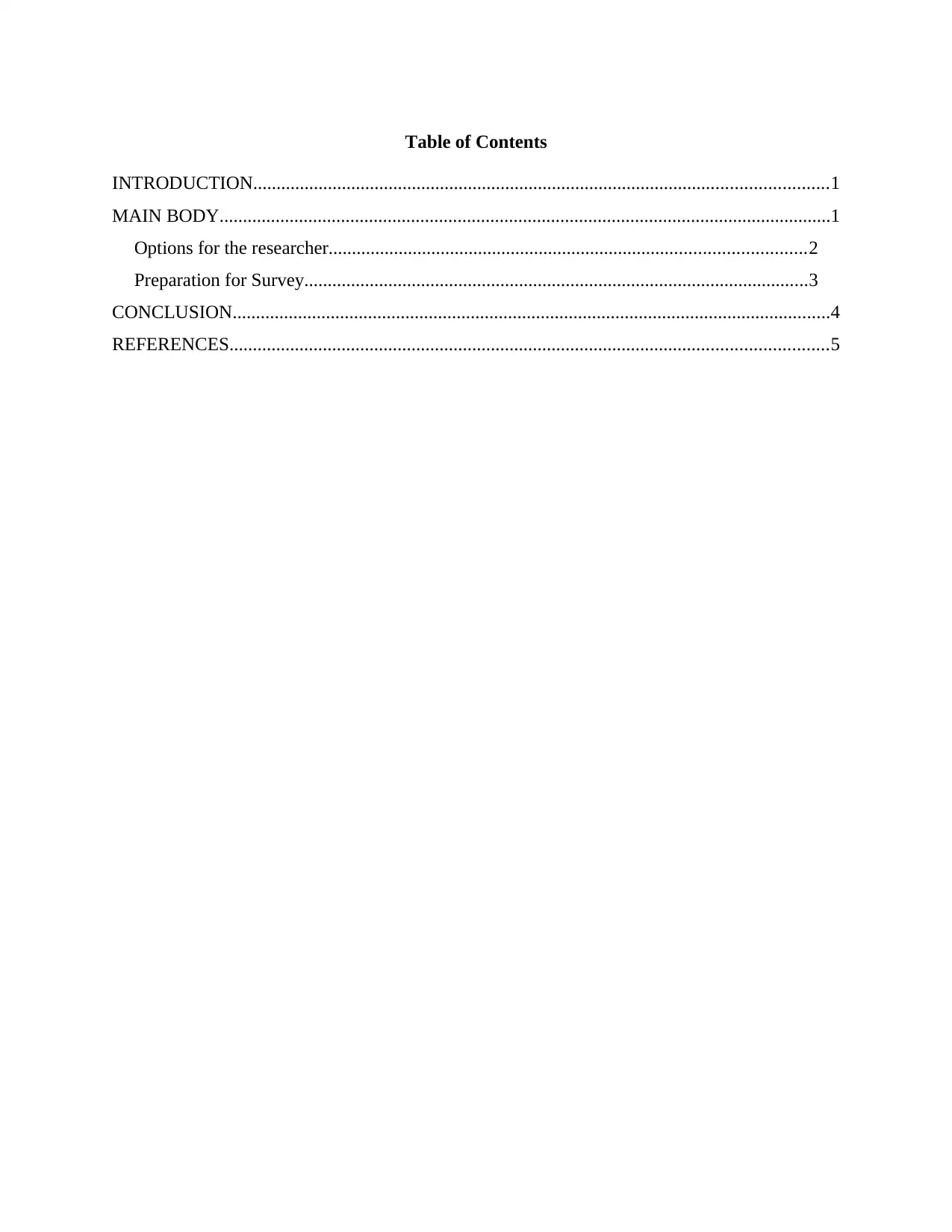
Table of Contents
INTRODUCTION...........................................................................................................................1
MAIN BODY...................................................................................................................................1
Options for the researcher......................................................................................................2
Preparation for Survey............................................................................................................3
CONCLUSION................................................................................................................................4
REFERENCES................................................................................................................................5
INTRODUCTION...........................................................................................................................1
MAIN BODY...................................................................................................................................1
Options for the researcher......................................................................................................2
Preparation for Survey............................................................................................................3
CONCLUSION................................................................................................................................4
REFERENCES................................................................................................................................5
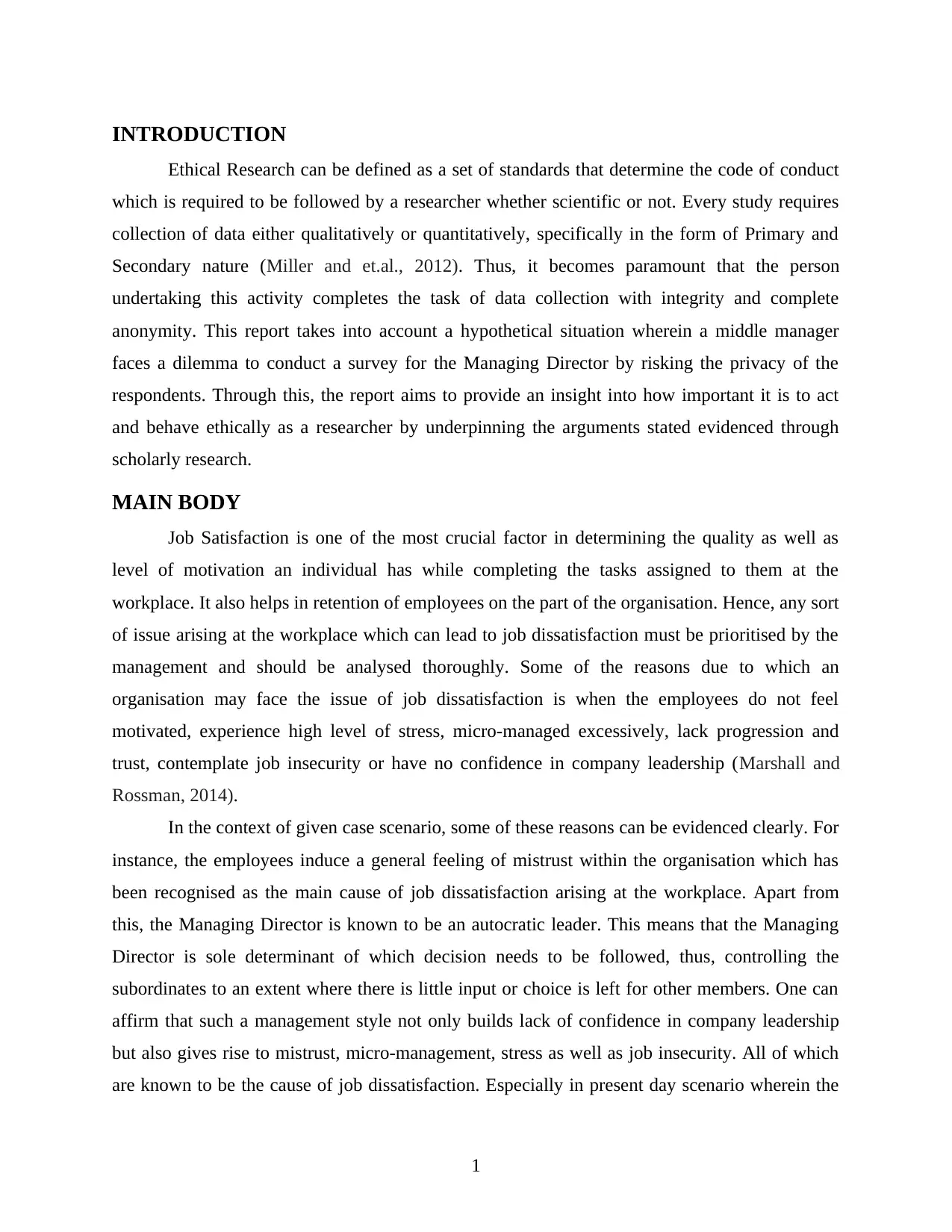
INTRODUCTION
Ethical Research can be defined as a set of standards that determine the code of conduct
which is required to be followed by a researcher whether scientific or not. Every study requires
collection of data either qualitatively or quantitatively, specifically in the form of Primary and
Secondary nature (Miller and et.al., 2012). Thus, it becomes paramount that the person
undertaking this activity completes the task of data collection with integrity and complete
anonymity. This report takes into account a hypothetical situation wherein a middle manager
faces a dilemma to conduct a survey for the Managing Director by risking the privacy of the
respondents. Through this, the report aims to provide an insight into how important it is to act
and behave ethically as a researcher by underpinning the arguments stated evidenced through
scholarly research.
MAIN BODY
Job Satisfaction is one of the most crucial factor in determining the quality as well as
level of motivation an individual has while completing the tasks assigned to them at the
workplace. It also helps in retention of employees on the part of the organisation. Hence, any sort
of issue arising at the workplace which can lead to job dissatisfaction must be prioritised by the
management and should be analysed thoroughly. Some of the reasons due to which an
organisation may face the issue of job dissatisfaction is when the employees do not feel
motivated, experience high level of stress, micro-managed excessively, lack progression and
trust, contemplate job insecurity or have no confidence in company leadership (Marshall and
Rossman, 2014).
In the context of given case scenario, some of these reasons can be evidenced clearly. For
instance, the employees induce a general feeling of mistrust within the organisation which has
been recognised as the main cause of job dissatisfaction arising at the workplace. Apart from
this, the Managing Director is known to be an autocratic leader. This means that the Managing
Director is sole determinant of which decision needs to be followed, thus, controlling the
subordinates to an extent where there is little input or choice is left for other members. One can
affirm that such a management style not only builds lack of confidence in company leadership
but also gives rise to mistrust, micro-management, stress as well as job insecurity. All of which
are known to be the cause of job dissatisfaction. Especially in present day scenario wherein the
1
Ethical Research can be defined as a set of standards that determine the code of conduct
which is required to be followed by a researcher whether scientific or not. Every study requires
collection of data either qualitatively or quantitatively, specifically in the form of Primary and
Secondary nature (Miller and et.al., 2012). Thus, it becomes paramount that the person
undertaking this activity completes the task of data collection with integrity and complete
anonymity. This report takes into account a hypothetical situation wherein a middle manager
faces a dilemma to conduct a survey for the Managing Director by risking the privacy of the
respondents. Through this, the report aims to provide an insight into how important it is to act
and behave ethically as a researcher by underpinning the arguments stated evidenced through
scholarly research.
MAIN BODY
Job Satisfaction is one of the most crucial factor in determining the quality as well as
level of motivation an individual has while completing the tasks assigned to them at the
workplace. It also helps in retention of employees on the part of the organisation. Hence, any sort
of issue arising at the workplace which can lead to job dissatisfaction must be prioritised by the
management and should be analysed thoroughly. Some of the reasons due to which an
organisation may face the issue of job dissatisfaction is when the employees do not feel
motivated, experience high level of stress, micro-managed excessively, lack progression and
trust, contemplate job insecurity or have no confidence in company leadership (Marshall and
Rossman, 2014).
In the context of given case scenario, some of these reasons can be evidenced clearly. For
instance, the employees induce a general feeling of mistrust within the organisation which has
been recognised as the main cause of job dissatisfaction arising at the workplace. Apart from
this, the Managing Director is known to be an autocratic leader. This means that the Managing
Director is sole determinant of which decision needs to be followed, thus, controlling the
subordinates to an extent where there is little input or choice is left for other members. One can
affirm that such a management style not only builds lack of confidence in company leadership
but also gives rise to mistrust, micro-management, stress as well as job insecurity. All of which
are known to be the cause of job dissatisfaction. Especially in present day scenario wherein the
1
⊘ This is a preview!⊘
Do you want full access?
Subscribe today to unlock all pages.

Trusted by 1+ million students worldwide
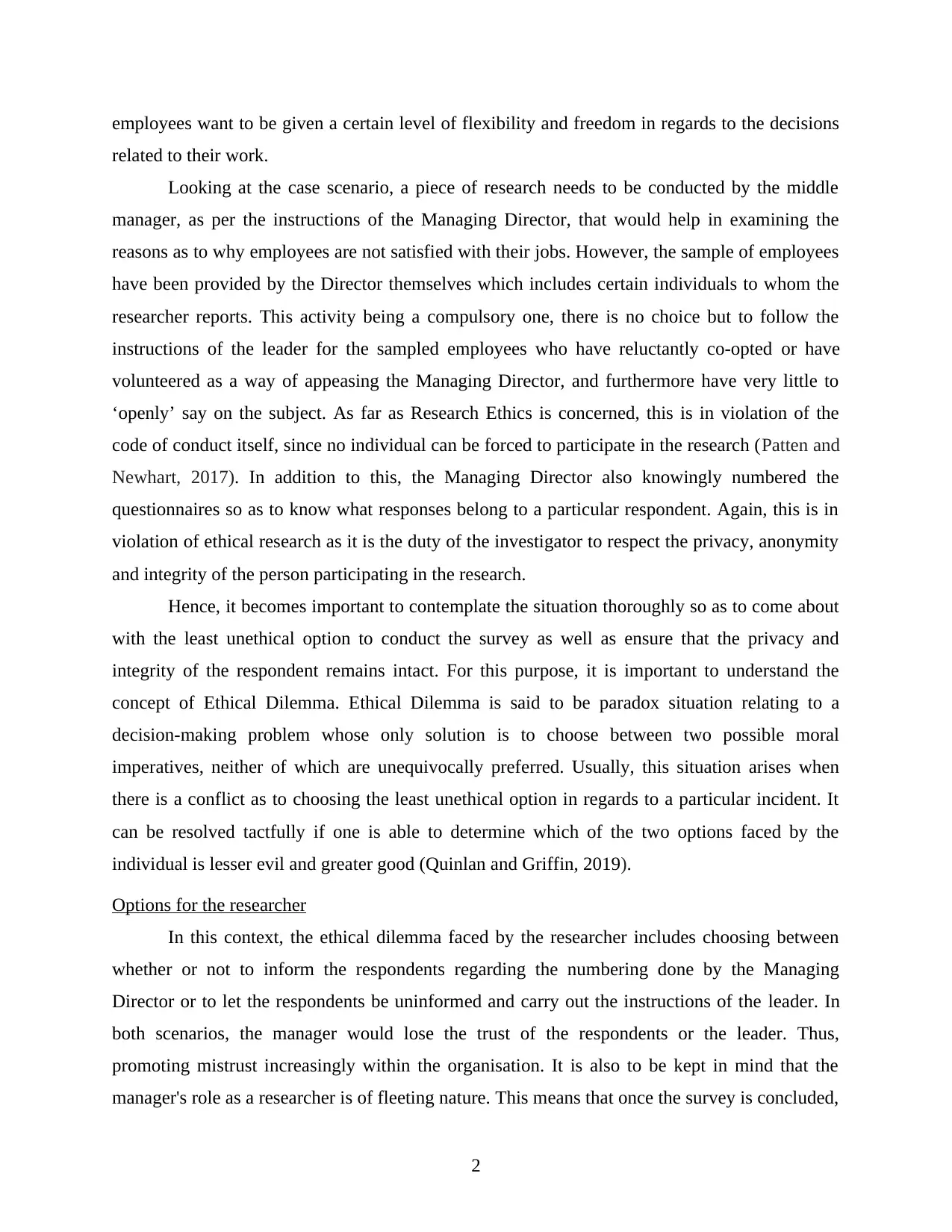
employees want to be given a certain level of flexibility and freedom in regards to the decisions
related to their work.
Looking at the case scenario, a piece of research needs to be conducted by the middle
manager, as per the instructions of the Managing Director, that would help in examining the
reasons as to why employees are not satisfied with their jobs. However, the sample of employees
have been provided by the Director themselves which includes certain individuals to whom the
researcher reports. This activity being a compulsory one, there is no choice but to follow the
instructions of the leader for the sampled employees who have reluctantly co-opted or have
volunteered as a way of appeasing the Managing Director, and furthermore have very little to
‘openly’ say on the subject. As far as Research Ethics is concerned, this is in violation of the
code of conduct itself, since no individual can be forced to participate in the research (Patten and
Newhart, 2017). In addition to this, the Managing Director also knowingly numbered the
questionnaires so as to know what responses belong to a particular respondent. Again, this is in
violation of ethical research as it is the duty of the investigator to respect the privacy, anonymity
and integrity of the person participating in the research.
Hence, it becomes important to contemplate the situation thoroughly so as to come about
with the least unethical option to conduct the survey as well as ensure that the privacy and
integrity of the respondent remains intact. For this purpose, it is important to understand the
concept of Ethical Dilemma. Ethical Dilemma is said to be paradox situation relating to a
decision-making problem whose only solution is to choose between two possible moral
imperatives, neither of which are unequivocally preferred. Usually, this situation arises when
there is a conflict as to choosing the least unethical option in regards to a particular incident. It
can be resolved tactfully if one is able to determine which of the two options faced by the
individual is lesser evil and greater good (Quinlan and Griffin, 2019).
Options for the researcher
In this context, the ethical dilemma faced by the researcher includes choosing between
whether or not to inform the respondents regarding the numbering done by the Managing
Director or to let the respondents be uninformed and carry out the instructions of the leader. In
both scenarios, the manager would lose the trust of the respondents or the leader. Thus,
promoting mistrust increasingly within the organisation. It is also to be kept in mind that the
manager's role as a researcher is of fleeting nature. This means that once the survey is concluded,
2
related to their work.
Looking at the case scenario, a piece of research needs to be conducted by the middle
manager, as per the instructions of the Managing Director, that would help in examining the
reasons as to why employees are not satisfied with their jobs. However, the sample of employees
have been provided by the Director themselves which includes certain individuals to whom the
researcher reports. This activity being a compulsory one, there is no choice but to follow the
instructions of the leader for the sampled employees who have reluctantly co-opted or have
volunteered as a way of appeasing the Managing Director, and furthermore have very little to
‘openly’ say on the subject. As far as Research Ethics is concerned, this is in violation of the
code of conduct itself, since no individual can be forced to participate in the research (Patten and
Newhart, 2017). In addition to this, the Managing Director also knowingly numbered the
questionnaires so as to know what responses belong to a particular respondent. Again, this is in
violation of ethical research as it is the duty of the investigator to respect the privacy, anonymity
and integrity of the person participating in the research.
Hence, it becomes important to contemplate the situation thoroughly so as to come about
with the least unethical option to conduct the survey as well as ensure that the privacy and
integrity of the respondent remains intact. For this purpose, it is important to understand the
concept of Ethical Dilemma. Ethical Dilemma is said to be paradox situation relating to a
decision-making problem whose only solution is to choose between two possible moral
imperatives, neither of which are unequivocally preferred. Usually, this situation arises when
there is a conflict as to choosing the least unethical option in regards to a particular incident. It
can be resolved tactfully if one is able to determine which of the two options faced by the
individual is lesser evil and greater good (Quinlan and Griffin, 2019).
Options for the researcher
In this context, the ethical dilemma faced by the researcher includes choosing between
whether or not to inform the respondents regarding the numbering done by the Managing
Director or to let the respondents be uninformed and carry out the instructions of the leader. In
both scenarios, the manager would lose the trust of the respondents or the leader. Thus,
promoting mistrust increasingly within the organisation. It is also to be kept in mind that the
manager's role as a researcher is of fleeting nature. This means that once the survey is concluded,
2
Paraphrase This Document
Need a fresh take? Get an instant paraphrase of this document with our AI Paraphraser
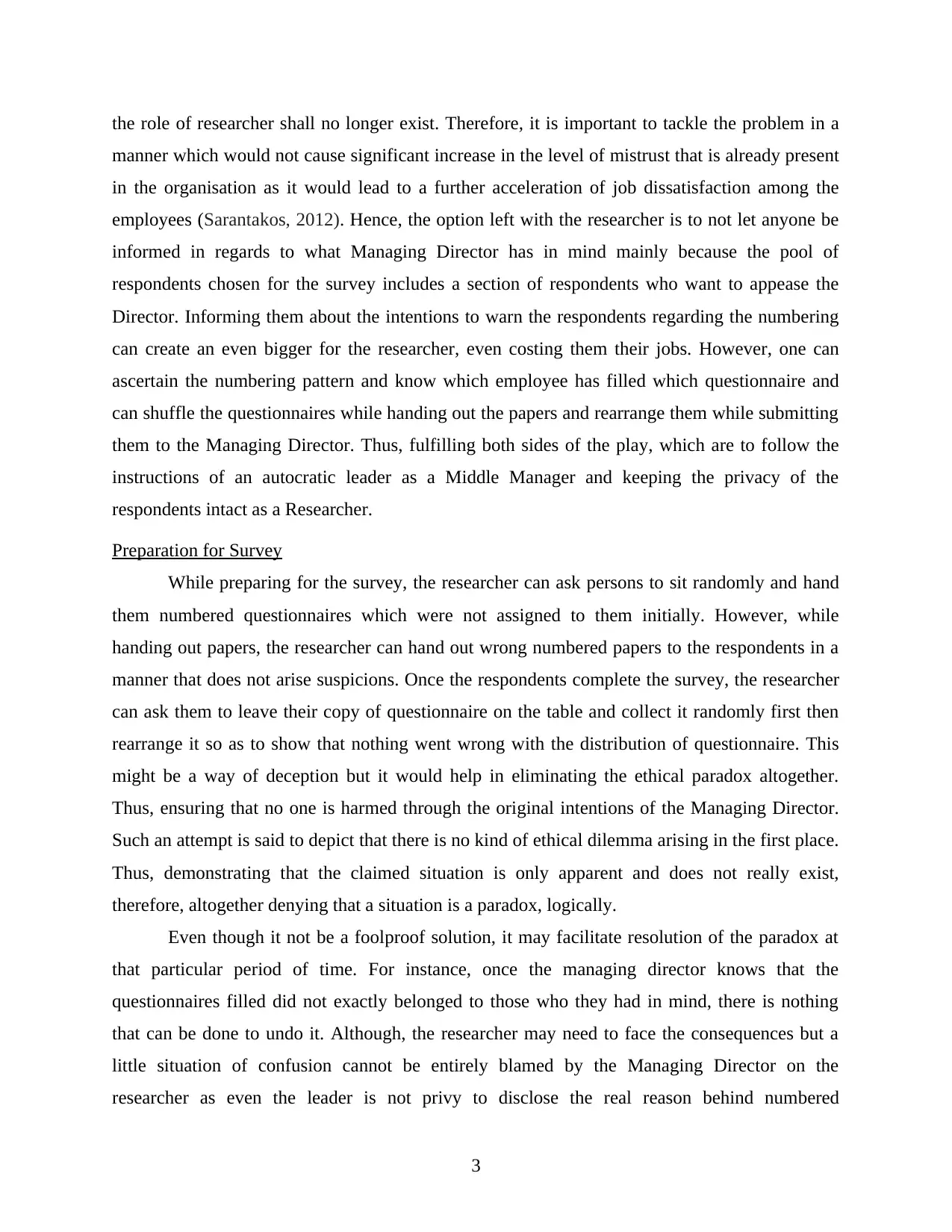
the role of researcher shall no longer exist. Therefore, it is important to tackle the problem in a
manner which would not cause significant increase in the level of mistrust that is already present
in the organisation as it would lead to a further acceleration of job dissatisfaction among the
employees (Sarantakos, 2012). Hence, the option left with the researcher is to not let anyone be
informed in regards to what Managing Director has in mind mainly because the pool of
respondents chosen for the survey includes a section of respondents who want to appease the
Director. Informing them about the intentions to warn the respondents regarding the numbering
can create an even bigger for the researcher, even costing them their jobs. However, one can
ascertain the numbering pattern and know which employee has filled which questionnaire and
can shuffle the questionnaires while handing out the papers and rearrange them while submitting
them to the Managing Director. Thus, fulfilling both sides of the play, which are to follow the
instructions of an autocratic leader as a Middle Manager and keeping the privacy of the
respondents intact as a Researcher.
Preparation for Survey
While preparing for the survey, the researcher can ask persons to sit randomly and hand
them numbered questionnaires which were not assigned to them initially. However, while
handing out papers, the researcher can hand out wrong numbered papers to the respondents in a
manner that does not arise suspicions. Once the respondents complete the survey, the researcher
can ask them to leave their copy of questionnaire on the table and collect it randomly first then
rearrange it so as to show that nothing went wrong with the distribution of questionnaire. This
might be a way of deception but it would help in eliminating the ethical paradox altogether.
Thus, ensuring that no one is harmed through the original intentions of the Managing Director.
Such an attempt is said to depict that there is no kind of ethical dilemma arising in the first place.
Thus, demonstrating that the claimed situation is only apparent and does not really exist,
therefore, altogether denying that a situation is a paradox, logically.
Even though it not be a foolproof solution, it may facilitate resolution of the paradox at
that particular period of time. For instance, once the managing director knows that the
questionnaires filled did not exactly belonged to those who they had in mind, there is nothing
that can be done to undo it. Although, the researcher may need to face the consequences but a
little situation of confusion cannot be entirely blamed by the Managing Director on the
researcher as even the leader is not privy to disclose the real reason behind numbered
3
manner which would not cause significant increase in the level of mistrust that is already present
in the organisation as it would lead to a further acceleration of job dissatisfaction among the
employees (Sarantakos, 2012). Hence, the option left with the researcher is to not let anyone be
informed in regards to what Managing Director has in mind mainly because the pool of
respondents chosen for the survey includes a section of respondents who want to appease the
Director. Informing them about the intentions to warn the respondents regarding the numbering
can create an even bigger for the researcher, even costing them their jobs. However, one can
ascertain the numbering pattern and know which employee has filled which questionnaire and
can shuffle the questionnaires while handing out the papers and rearrange them while submitting
them to the Managing Director. Thus, fulfilling both sides of the play, which are to follow the
instructions of an autocratic leader as a Middle Manager and keeping the privacy of the
respondents intact as a Researcher.
Preparation for Survey
While preparing for the survey, the researcher can ask persons to sit randomly and hand
them numbered questionnaires which were not assigned to them initially. However, while
handing out papers, the researcher can hand out wrong numbered papers to the respondents in a
manner that does not arise suspicions. Once the respondents complete the survey, the researcher
can ask them to leave their copy of questionnaire on the table and collect it randomly first then
rearrange it so as to show that nothing went wrong with the distribution of questionnaire. This
might be a way of deception but it would help in eliminating the ethical paradox altogether.
Thus, ensuring that no one is harmed through the original intentions of the Managing Director.
Such an attempt is said to depict that there is no kind of ethical dilemma arising in the first place.
Thus, demonstrating that the claimed situation is only apparent and does not really exist,
therefore, altogether denying that a situation is a paradox, logically.
Even though it not be a foolproof solution, it may facilitate resolution of the paradox at
that particular period of time. For instance, once the managing director knows that the
questionnaires filled did not exactly belonged to those who they had in mind, there is nothing
that can be done to undo it. Although, the researcher may need to face the consequences but a
little situation of confusion cannot be entirely blamed by the Managing Director on the
researcher as even the leader is not privy to disclose the real reason behind numbered
3
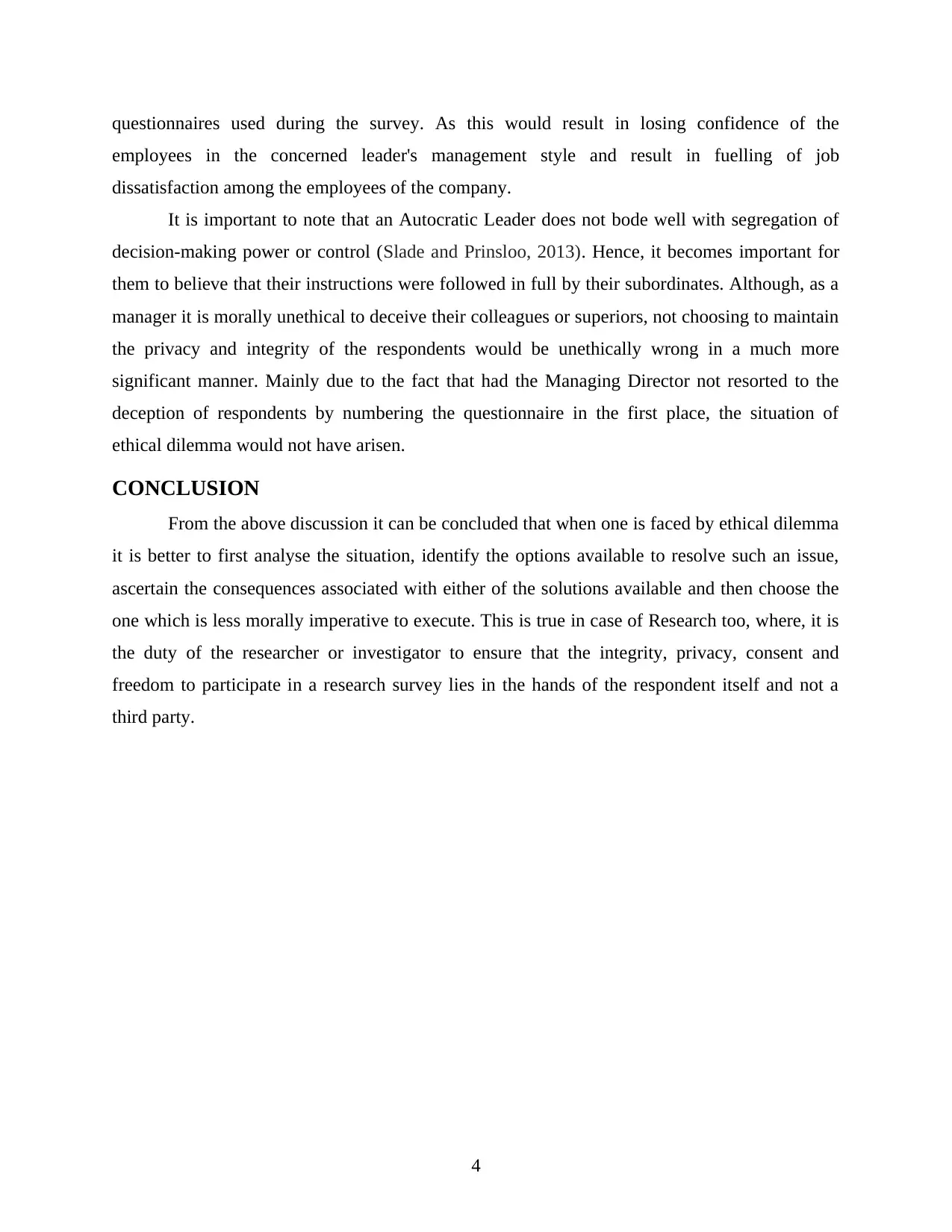
questionnaires used during the survey. As this would result in losing confidence of the
employees in the concerned leader's management style and result in fuelling of job
dissatisfaction among the employees of the company.
It is important to note that an Autocratic Leader does not bode well with segregation of
decision-making power or control (Slade and Prinsloo, 2013). Hence, it becomes important for
them to believe that their instructions were followed in full by their subordinates. Although, as a
manager it is morally unethical to deceive their colleagues or superiors, not choosing to maintain
the privacy and integrity of the respondents would be unethically wrong in a much more
significant manner. Mainly due to the fact that had the Managing Director not resorted to the
deception of respondents by numbering the questionnaire in the first place, the situation of
ethical dilemma would not have arisen.
CONCLUSION
From the above discussion it can be concluded that when one is faced by ethical dilemma
it is better to first analyse the situation, identify the options available to resolve such an issue,
ascertain the consequences associated with either of the solutions available and then choose the
one which is less morally imperative to execute. This is true in case of Research too, where, it is
the duty of the researcher or investigator to ensure that the integrity, privacy, consent and
freedom to participate in a research survey lies in the hands of the respondent itself and not a
third party.
4
employees in the concerned leader's management style and result in fuelling of job
dissatisfaction among the employees of the company.
It is important to note that an Autocratic Leader does not bode well with segregation of
decision-making power or control (Slade and Prinsloo, 2013). Hence, it becomes important for
them to believe that their instructions were followed in full by their subordinates. Although, as a
manager it is morally unethical to deceive their colleagues or superiors, not choosing to maintain
the privacy and integrity of the respondents would be unethically wrong in a much more
significant manner. Mainly due to the fact that had the Managing Director not resorted to the
deception of respondents by numbering the questionnaire in the first place, the situation of
ethical dilemma would not have arisen.
CONCLUSION
From the above discussion it can be concluded that when one is faced by ethical dilemma
it is better to first analyse the situation, identify the options available to resolve such an issue,
ascertain the consequences associated with either of the solutions available and then choose the
one which is less morally imperative to execute. This is true in case of Research too, where, it is
the duty of the researcher or investigator to ensure that the integrity, privacy, consent and
freedom to participate in a research survey lies in the hands of the respondent itself and not a
third party.
4
⊘ This is a preview!⊘
Do you want full access?
Subscribe today to unlock all pages.

Trusted by 1+ million students worldwide
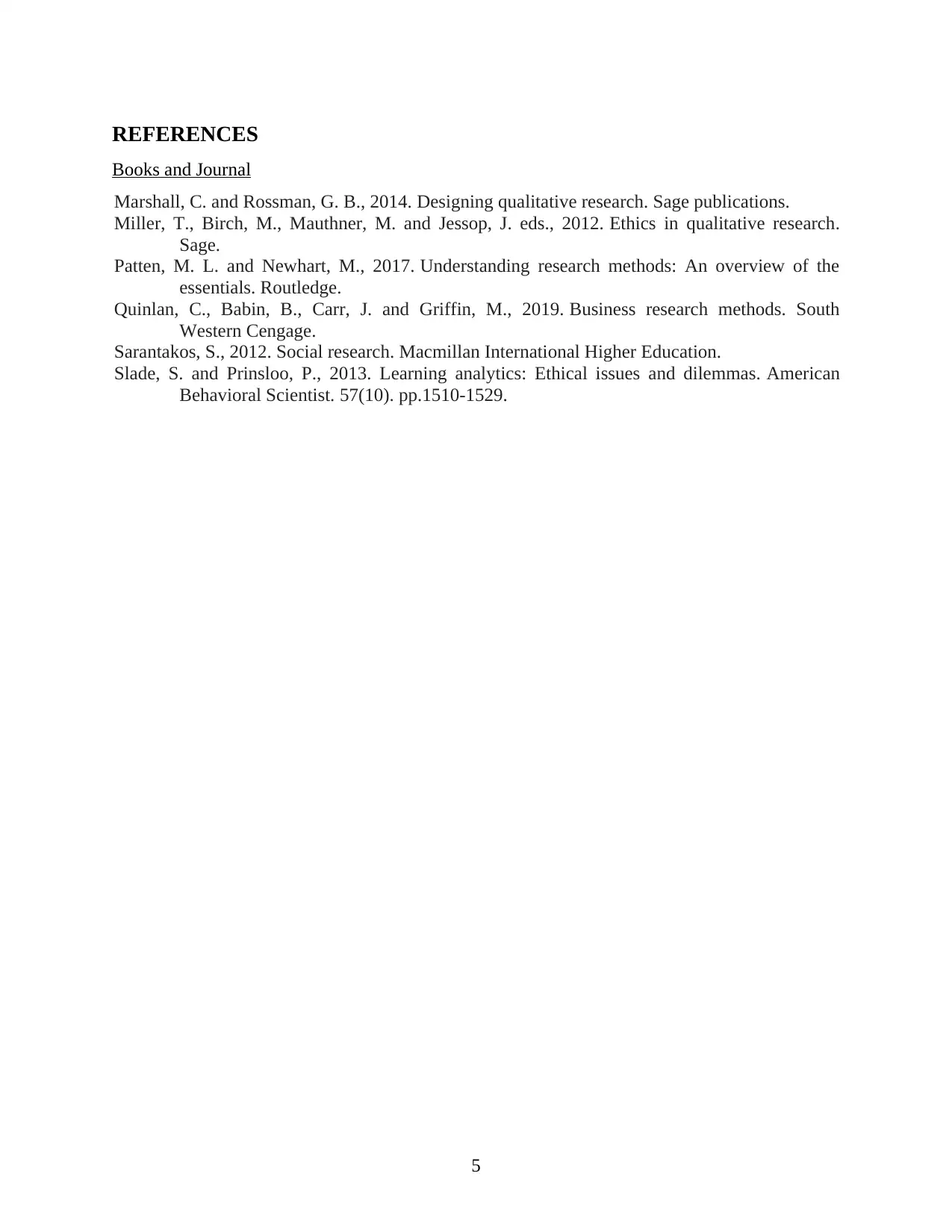
REFERENCES
Books and Journal
Marshall, C. and Rossman, G. B., 2014. Designing qualitative research. Sage publications.
Miller, T., Birch, M., Mauthner, M. and Jessop, J. eds., 2012. Ethics in qualitative research.
Sage.
Patten, M. L. and Newhart, M., 2017. Understanding research methods: An overview of the
essentials. Routledge.
Quinlan, C., Babin, B., Carr, J. and Griffin, M., 2019. Business research methods. South
Western Cengage.
Sarantakos, S., 2012. Social research. Macmillan International Higher Education.
Slade, S. and Prinsloo, P., 2013. Learning analytics: Ethical issues and dilemmas. American
Behavioral Scientist. 57(10). pp.1510-1529.
5
Books and Journal
Marshall, C. and Rossman, G. B., 2014. Designing qualitative research. Sage publications.
Miller, T., Birch, M., Mauthner, M. and Jessop, J. eds., 2012. Ethics in qualitative research.
Sage.
Patten, M. L. and Newhart, M., 2017. Understanding research methods: An overview of the
essentials. Routledge.
Quinlan, C., Babin, B., Carr, J. and Griffin, M., 2019. Business research methods. South
Western Cengage.
Sarantakos, S., 2012. Social research. Macmillan International Higher Education.
Slade, S. and Prinsloo, P., 2013. Learning analytics: Ethical issues and dilemmas. American
Behavioral Scientist. 57(10). pp.1510-1529.
5
1 out of 7
Related Documents
Your All-in-One AI-Powered Toolkit for Academic Success.
+13062052269
info@desklib.com
Available 24*7 on WhatsApp / Email
![[object Object]](/_next/static/media/star-bottom.7253800d.svg)
Unlock your academic potential
Copyright © 2020–2025 A2Z Services. All Rights Reserved. Developed and managed by ZUCOL.




